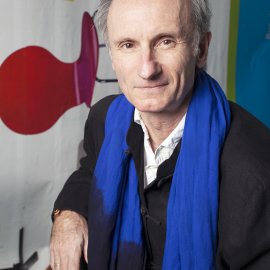Professor at the University of Picardie Jules Vernes

Janvier à juin 2020
Lorenzo Vinciguerra (1964), of Italian and French citizenship, comes from a family of painters (French side) and lawyers (Italian side). He grew up and trained in Italy where he studied painting and philosophy. Alumni of the Brera School of Fine Arts in Milan (where he was a student of the artist Vincenzo Ferrari) and of the Scuola Normale Superiore of Pisa, he is graduate of the University of Milan (where he was a student of Carlo Sini). Boarder at the Ecole Normale Supérieure in Paris, he is agrégé in philosophy and Doctor of philosophy from the Sorbonne. He taught at the universities of Paris I Panthéon-Sorbonne, Grenoble and Reims. Currently he is a professor at the University of Amiens (France), where he directs the Research Center for Arts and Aesthetics (CRAE EA 4291). He has been invited to teach and lecture at universities in different countries in Europe and elsewhere (Russia, Brazil, Argentina, Canada, Israel). Since 2007 at the EHESS in Paris, he has been leading the seminar Anthropologie générale et philosophie with François Flahault and François Dingremont. His work has focused on the philosophy of the classical age (Spinoza and Spinozism in particular), philosophical anthropology and philosophy of art.
"Figures of the labyrinth in the philosophical literature of modernity. Games and stakes of a graphic archetype"
The rationalisms of the European classical age seem to have turned away radically from a topos of tradition, symbol of the human condition: the labyrinth and its image of the quest for meaning. The search for the method (methodos) and the novum organum, elected to new instruments of the constitution of the sciences, was done to the detriment of the very old idea of path (‘odos), way. The investigation we are conducting concerns the particularly philosophical literature of this period, where the reference (explicit or implicit) to the image of labyrinths and its avatars reveals the work of demarcation led by modernity vis-à-vis the tradition. The question of forgetfulness, even repression, of the labyrinthine model is itself symptomatic of a new ethos, of a new way of being in the world, which is beginning to impose itself in the West. That of a man donning the clothes of the « maître et possesseur » of a nature, from which he would have extracted himself on the path of emancipation through the mastery of science and technology. It will be in charge of this investigation to show how this Promethean program encounters resistance and that the labyrinthine scheme does not lose its relevance at the very moment when it seems to want to free itself from it.
Vinciguerra, Lorenzo and MOREAU, Pierre-François (eds). Spinoza et les arts, Paris : L’Harmattan, 2019.
Vinciguerra, Lorenzo. Spinoza et le signe. La logique de l’imagination, Paris : Vrin, 2018
Vinciguerra, Lorenzo. Spinoza, Roma : Carocci, 2015.
Vinciguerra, Lorenzo. La semiotica di Spinoza, prefazione di Carlo Sini, Pisa : ETS, 2012.
Vinciguerra, Lorenzo and BOURLEZ, Fabrice (eds). L’Œil et l’Esprit. Merleau-Ponty entre art et philosophie, Reims : PUR, 2015.